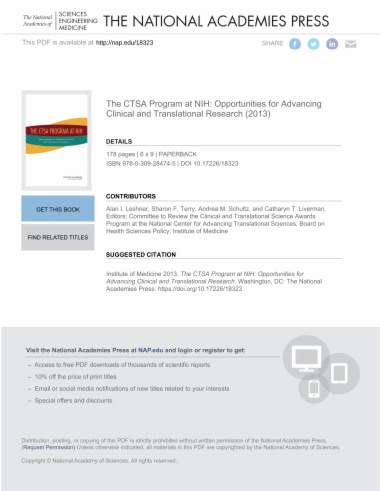

In 2006 the National Institutes of Health (NIH) established the Clinical and Translational Science Awards (CTSA) Program, recognizing the need for a new impetus to encourage clinical and translational research. At the time it was very difficult to translate basic and clinical research into clinical and community practice; making it difficult for individual patients and communities to receive its benefits. Since its creation the CTSA Program has expanded, with 61 sites spread across the nation's academic health centers and other institutions, hoping to provide catalysts and test beds for policies and practices that can benefit clinical and translation research organizations throughout the country.
The NIH contracted with the Institute of Medicine (IOM) in 2012 to conduct a study to assess and provide recommendations on appropriateness of the CTSA Program's mission and strategic goals and whether changes were needed. The study was also address the implementation of the program by the National Center for Advancing Translational Sciences (NCATS) while exploring the CTSA's contributions in the acceleration of the development of new therapeutics. A 13-member committee was established to head this task; the committee had collective expertise in community outreach and engagement, public health and health policy, bioethics, education and training, pharmaceutical research and development, program evaluation, clinical and biomedical research, and child health research.
The CTSA Program at NIH: Opportunities for Advancing Clinical and Translational Research is the result of investigations into previous program evaluations and assessments, open-session meetings and conference class, and the review of scientific literature. Overall, the committee believes that the CTSA Program is significant to the advancement of clinical and translational research through its contributions. The Program would benefit from a variety of revisions, however, to make it more efficient and effective.